Rangers: Sandy Easdale power of veto leaves fans group uneasy
- Published
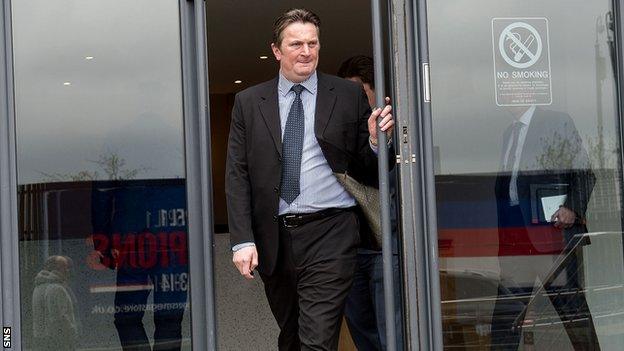
Sandy Easdale owns 5.21% of the company and has proxy voting rights for, but does not own, a further 20.94%.
Even a period of quiet brings agitation to Rangers. It is seven days since the board completed the raising of £3.13m from the issuing of shares to existing shareholders in Rangers International Football Club plc, but that has not brought respite from the speculation and consternation.
The annual accounts were expected to be published imminently, with the annual general meeting to be held in October. It is now more likely that the AGM will be in November, with the results published at least 28 days in advance, the statutory notice period.
The timing is significant, because any information coming out of Ibrox always has to be assessed with the bigger picture in mind.
Rangers need additional finance. The money raised recently will only last into December and the board's stated aim was to seek permission from shareholders at the AGM to hold a further share issue, which would be open to non-shareholders.
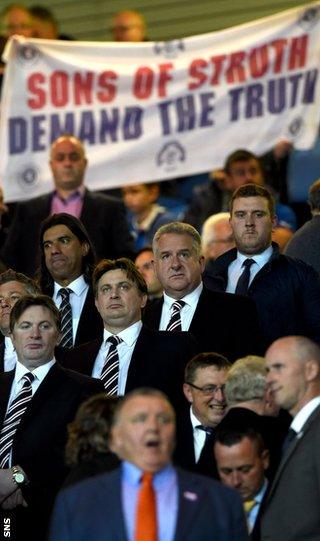
Sandy Easdale, James Easdale and Graham Wallace have incurred the wrath of some fans.
The chief executive, Graham Wallace, stated in his 120-day review of the business that around £20m to £30m would be required to restore Rangers to its previous status in Scottish football, an amount he intended to raise over a period of time.
There is a critical need for fresh funds, though, just to finance Rangers to the end of the season. Ideally, a sum would be raised that would enable the rebuilding of the club's football infrastructure and provide stability off the field.
With 15,000 fans having decided not to renew their season tickets last summer, Rangers is an institution in need of repair, both materially but also in terms of the lack of trust between some sections of the supporter base and some of the directors and shareholders.
Discontent has been rife at times, but the fundamental issue is that Rangers' finances are fragile. The annual accounts need to be audited by Deloittes and the six-month results noted that the business was only viable as a going concern if the season ticket sales were on a par with last year's total of 38,000.
The £3.13m was raised to cover the shortfall from only around 23,000 having been sold, but the board is also taking some time to explore their fundraising options.
Any non-shareholder prepared to invest significant funds in Rangers - and the South African-based businessman, Dave King, remains committed to putting money into the club that he has supported since his childhood in Glasgow - would seek an element of control. Some shareholders and directors have previously resisted King for that reason, but members of the current board have been in discussions about King investing.
Wallace has not been acting alone, since he was accompanied to a recent meeting in London by another board member, although not the finance director, Philip Nash. When Wallace's predecessor, Craig Mather, flew to South Africa to meet King last year, the consequence was his dismissal.
The dynamic within Rangers is different now, although a shareholder bloc does appear to continue to work together.
Sandy Easdale, who is chairman of the football board but not a plc director, owns 5.21% of the company and has proxy voting rights for, but does not own, a further 20.94%. The figures are significant because any resolution for dis-application of pre-emption rights - to allow shares to be issued to non-shareholders - requires a 75% majority at the AGM and Easdale controls 26.15%.
That situation alone irks the Union of Fans, a coalition of Rangers supporters groups, which has previously called for the plc board to remove Easdale from his position at the club.
"Mr Easdale and his associates have invested just enough to keep them above the 25% mark required to hold a veto over any inward investment to the club via a further, more substantial, share offer," said the UoF in a statement.
"We have long been concerned that Mr Easdale refuses to disclose who he actually holds these proxies for and instead disguises them through Beaufort Nominees. Mr Easdale's recent meeting with convicted fraudster Rafat Rizvi would lead us to believe that some of those proxy voting rights may be held on behalf of Mr Rizvi.
"It is also clear from this recent announcement, despite PR stories placed in the media to the contrary, that Mr Easdale has not purchased Charles Green's shares. We are therefore in a position where Mr Easdale appears to hold, through Beaufort Nominees, proxies for people such as Charles Green, Rafat Rizvi and Imran Ahmad.
"We would ask Mr Easdale to confirm publicly that he and his associates will not oppose any resolution at the upcoming AGM which would allow fresh investment from those who care about the future of our club. If Mr Easdale ignores this request or refuses to answer unequivocally then, in the near future, we will recommend what course of action we believe fans should take."
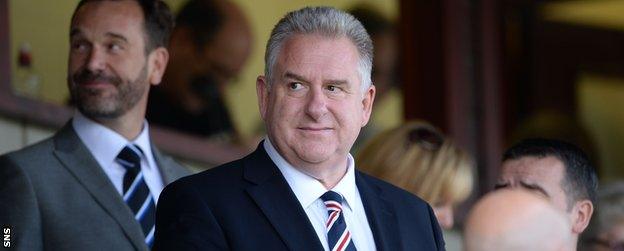
Chief executive Graham Wallace must balance the desires of shareholders and directors with the need to placate a restless Rangers support.
The coming weeks will determine Rangers' immediate future but also perhaps the long-term. If investment through a share issue is blocked, an alternative means of funding will need to be found.
Mike Ashley did not participate in the recent share issue and has re-iterated his commitment to Newcastle United, but he does have a commercial agreement with Rangers and could in theory provide an advance on the revenues attached to that joint venture.
That, though, would reduce the amount of income available to Rangers in the future, so would be a short-term fix at best. A series of those have been applied in recent years, leaving the club weakened while a growing number of supporters became disillusioned.
Any solution to Rangers' funding problems will only prove long-lasting if it is accompanied with a change in the director and shareholder dynamic that repairs the fractured relationship with a large number of the supporters.
How Wallace and the board handle these complex, interlocking difficulties will be crucial.
- Published24 September 2014
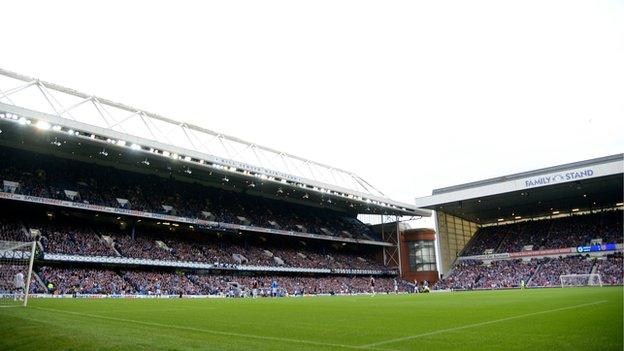
- Published24 September 2014

- Published22 September 2014
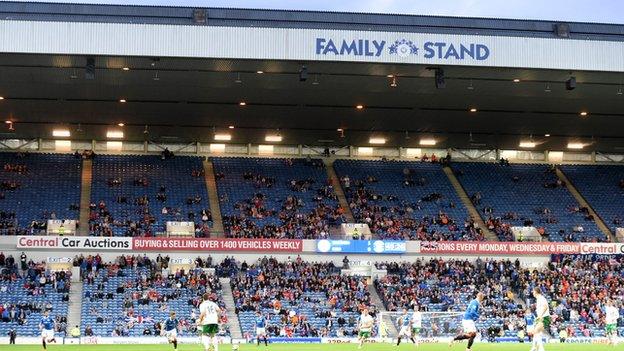
- Published16 September 2014
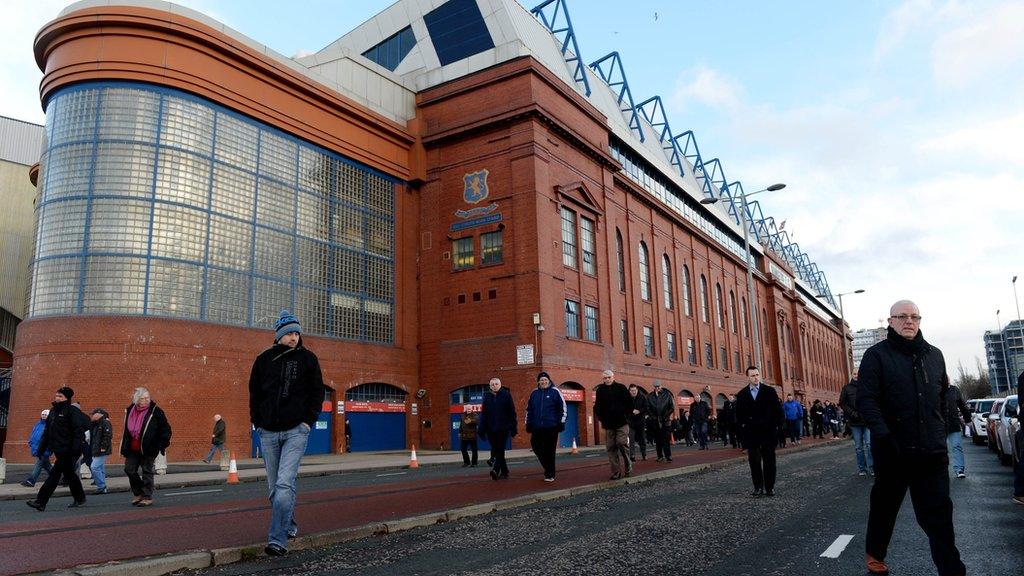
- Published10 September 2014

- Published7 June 2019
